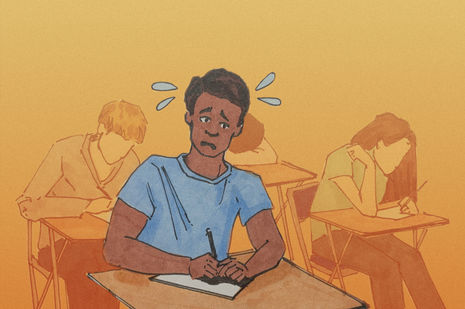Friends, rivals, coursemates: on competition and camaraderie in Cambridge
With exam rankings set to be abolished, Rosalind Aumonier speaks to students about the competitive atmosphere that, for some, defines Cambridge

Competition is everywhere at Cambridge. Aspiring students compete in the hopes of achieving an offer, colleges compete to top the Tompkins table, the university competes for sporting victory or international prestige with The Other Place, and undergraduates compete between themselves for coveted positions at the top of the Tripos rankings.
On the 28th April, the University’s governing body passed a proposal to alleviate a “culture of overwork” in undergraduate teaching, including provisions to replace the Tripos rankings system. Examination results in Mathematics were first publicly displayed outside Senate House in 1748, a tradition that continued up until the 21st century. In 2018, the Cambridge University Student Union denounced the use of confidential student class list data to produce college rankings, naming it “the worst of the academic culture here in Cambridge”.
One second-year NatSci at Gonville & Caius noted that while rankings could be useful for “LinkedIn warriors,” they formalised the system of competition between students; a student could get a solid grade but still feel bad, he said, because they were no longing competing for their own goals, but against everyone else.
The competitor the Cambridge student sees the most is their supervision partner. Yet viewing supervision partners solely as our rivals removes the potential for a different kind of amicable argument, the kind that spurs you on to defend your perspective, or forces you to change it.
“I was told by my DoS that competition between our cohort was natural, and even helpful”
In my freshers’ week, I was told by my DoS that (healthy) competition between our cohort was natural, and even helpful. Competition has extended into my relationships with my coursemates, but in less of a ‘I must rank higher than you or all of this has been for nothing’ (the Rory Gilmore-Paris Geller kind that I’d seen in school and was half-expecting here) and more ‘your opinion of John Donne is clearly wrong and I’ll help you see exactly why’. In supervisions, we’re as likely to build on each other’s points as to counter-argue.
Zainab, a first-year HSPS student, said that the Tripos ranking system affected her relationship with other HSPS students outside of her close friends: to her, her coursemates would always be viewed through a slight frame of competitiveness. In Cambridge’s “academically intense” environment, she said, “having empirical data [about where you are in a cohort] could feel like a blatant reminder of what you lack compared to others”.
This competitive anxiety doesn’t just stem from course structure or supervisors’ occasional comparative remarks, but can also emerge from students themselves. One MML student was paired in a supervision with someone who “frequently interrupted her” and “actually laughed at my points in the supervision,” which went unnoticed by their supervisor. Otherwise, she said she only experienced “two or three very competitive supervision partners, which isn’t too bad”. Supervision partners – like a bad supervisor – can make or break the safe space that is Cambridge’s distinctive pedagogical core.
“[it is] nice to be surrounded by people who are smarter than you.”
Learning from our peers can be invaluable. Max, an Engling at Trinity Hall, said that he and his coursemates meet once a week outside of supervisions to discuss their weekly essays, which he found can be “more generative than the supervisions themselves”.
Similarly, Blanca, a HML student at Newnham, pointed to her coursemates’ knowledge as an advantage of group supervisions. She said their opinions gave her “another way to examine the evidence that was presented”. Although the “comparative aspect [of Cambridge in general] does get you down,” she said, it can be “nice to be surrounded by people who are smarter than you”.
Our relationships with our peers can be co-operative, rather than competitive, forming relationships in which coursemates can support us (buying Jacks on the way back from exhausting classes was a staple of my Lent term) and argue with us (as were expressions of horror at my friends’ literary opinions) but not ‘defeat’ us. Maia, one of my own supervision partners, told me that “if I’m in a supervision with [one of my friends] and my supervisor’s destroying my essay, and I know she’s not sitting there laughing at me […] I don’t have to feel as self-conscious”.
I consider myself lucky not just to have met so many people smarter than me (and willing to argue with me), but to count so many of them as my closest friends. In spite of the high-pressure environment of Cambridge, these relationships, born out of competition, but maintained through everyday acts of support, can remind us of what we love about learning.
 News / Judge Business School advisor resigns over Epstein and Andrew links18 February 2026
News / Judge Business School advisor resigns over Epstein and Andrew links18 February 2026 News / Hundreds of Cambridge academics demand vote on fate of vet course20 February 2026
News / Hundreds of Cambridge academics demand vote on fate of vet course20 February 2026 News / Petition demands University reverse decision on vegan menu20 February 2026
News / Petition demands University reverse decision on vegan menu20 February 2026 News / CUCA members attend Reform rally in London20 February 2026
News / CUCA members attend Reform rally in London20 February 2026 News / Gov grants £36m to Cambridge supercomputer17 February 2026
News / Gov grants £36m to Cambridge supercomputer17 February 2026










